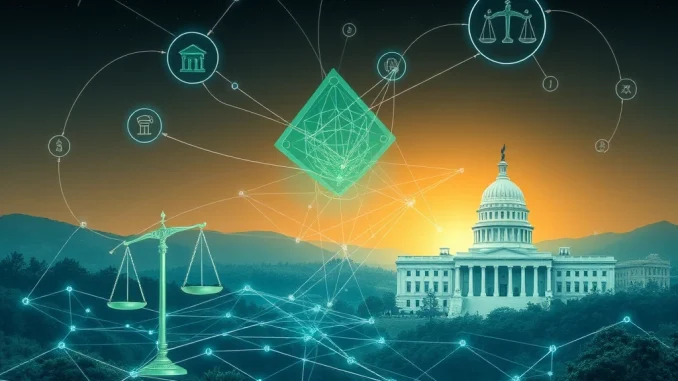
The landscape of digital assets is constantly evolving, bringing with it complex questions about how existing laws apply to new technologies. For anyone following the cryptocurrency space, the ongoing dialogue with regulators, particularly the US SEC, is a critical point of interest. A recent development from the Solana Policy Institute is set to add a significant voice to this conversation, proposing a fresh perspective on how decentralized protocols should be treated under current securities laws.
Why is the Solana Policy Institute Engaging with the SEC?
The core of the matter lies in the fundamental differences between traditional financial systems and the innovative structures built on blockchain technology. The Solana Policy Institute (SPI), a non-profit organization focused on policy issues within the Solana ecosystem and broader Web3 space, has taken a proactive step. They’ve formally submitted a proposal to the US SEC, advocating for specific regulatory exemptions for protocols that are truly decentralized.
This isn’t just a unilateral effort. SPI is collaborating with other key players in the Solana ecosystem, including Phantom (a popular wallet), Superstate (a regulated asset manager exploring blockchain), and Orca (a decentralized exchange). This collaboration highlights a unified industry effort to engage with regulators constructively.
What Exactly is the Proposal Regarding SEC Regulation?
The central argument put forth by SPI and its collaborators is that the existing framework of securities laws, designed for centralized entities like brokers, dealers, and custodians, does not appropriately fit genuinely decentralized systems. They contend that applying the same rules to protocols that operate without a central point of control, and where functions are automated and distributed across a network, is like trying to fit a square peg in a round hole.
Key points of their argument include:
- Decentralization Matters: Unlike traditional financial intermediaries that have centralized control over assets and operations, decentralized protocols are designed to minimize or eliminate central authority. Decisions are often made via community governance, and operations are executed by code on a distributed ledger.
- Non-Custodial Infrastructure: Many core blockchain protocols and applications are non-custodial, meaning users retain direct control over their private keys and, therefore, their assets. This is a stark contrast to traditional custodians who hold assets on behalf of clients. SPI argues that infrastructure that is non-custodial and facilitates peer-to-peer interaction should be regulated differently, perhaps under a framework that acknowledges the user’s direct control and the lack of a central point of failure or control.
- Different Risks: While risks exist in decentralized finance (DeFi), they are often different in nature from those in traditional finance. Risks might include smart contract vulnerabilities, oracle failures, or governance attacks, rather than the risks associated with centralized counterparty failure or mismanagement of client funds by an intermediary.
Why Are Regulatory Exemptions Crucial for Decentralized Protocols?
The current uncertainty surrounding how SEC regulation applies to various aspects of the crypto market, particularly DeFi and decentralized applications, creates significant hurdles for innovation and development in the United States. The fear of inadvertently violating securities laws designed for centralized entities can stifle growth, push development offshore, and limit access for U.S. participants.
Granting exemptions, or creating a tailored regulatory approach for truly decentralized protocols, could provide much-needed clarity. This clarity could:
- Foster Innovation: Encourage developers and entrepreneurs to build and deploy decentralized applications and infrastructure within the U.S. without the constant specter of inappropriate regulatory classification.
- Enhance Competitiveness: Position the U.S. as a leader in blockchain technology by providing a clear, albeit distinct, path for decentralized innovation compared to centralized models.
- Protect Consumers Differently: While not traditional investor protection in the sense of safeguarding against broker misconduct, a tailored approach could focus on ensuring transparency, code audits, and clear risk disclosures relevant to decentralized systems.
The SPI’s proposal aims to initiate a dialogue that could lead to a regulatory framework that acknowledges the unique technical and operational characteristics of decentralized systems, rather than trying to force them into existing molds that don’t fit.
How Does This Relate to Broader Crypto Regulation?
The proposal from the Solana Policy Institute is part of a larger, ongoing conversation between the crypto industry and regulators globally. The US SEC, under Chairman Gary Gensler, has largely taken the stance that many cryptocurrencies and related activities fall under existing securities laws. This has led to enforcement actions and ongoing legal battles.
The industry’s response has often been to argue for new, tailored regulations or, as in this case, for exemptions where existing rules are fundamentally unsuitable. The debate often centers on the ‘Howey Test,’ a legal framework used to determine if something is an ‘investment contract’ and thus a security. Proponents of decentralization argue that many protocols, once sufficiently decentralized, no longer meet the criteria of the Howey Test, particularly the expectation of profits derived from the efforts of a promoter or third party.
The SPI’s proposal specifically targets the *infrastructure* layer and truly decentralized applications, seeking to carve out a space that is clearly distinct from centralized crypto businesses that do resemble traditional financial intermediaries.
What Are the Challenges and the Path Forward?
Getting the US SEC to adopt a new approach or grant significant exemptions is a challenging task. Regulators are primarily focused on investor protection and market integrity. They may view decentralization claims with skepticism, worrying about the potential for manipulation, lack of clear accountability, and the difficulty of enforcement in truly distributed systems.
The path forward likely involves continued dialogue, education, and potentially legislative action. The SPI’s proposal is a step in the dialogue process, aiming to provide the SEC with a detailed rationale for differential treatment. Success will depend on the ability of the industry to clearly articulate the benefits and risks of decentralized systems in a way that regulators can understand and address within their mandate.
Conclusion: A Pivotal Moment for Decentralized Protocols
The proposal from the Solana Policy Institute to the US SEC marks a significant effort by the industry to proactively engage on the critical issue of crypto regulation. By arguing for regulatory exemptions for truly decentralized protocols based on their unique characteristics, SPI and its collaborators are pushing for a nuanced approach that could significantly impact the future of blockchain innovation in the United States. Whether the SEC will be receptive remains to be seen, but this initiative highlights the growing need for clear, appropriate regulatory frameworks that foster innovation while addressing potential risks in the rapidly evolving world of digital assets.



